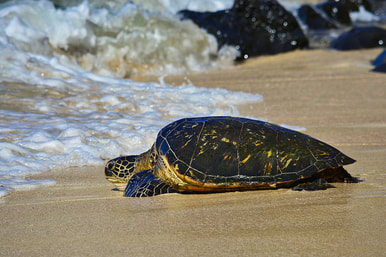Oceans made of plastic: when will we stop destroying our seas?

One truck of rubbish enters our oceans every minute. Much of this is plastic that will not degrade naturally with time. We can limit plastic pollution in many ways - it starts by simply using less plastic in our everyday lives. Supermarkets can do a lot to help, such as having paper packaging. The carrier bag charge was a very beneficial, and the first step towards reducing the nation’s plastic consumption. We could also take measures such as eliminating plastic bottles; on an individual level, we can do things such as taking reusable bottles to school rather than disposable ones.
Microbeads are small, manufactured plastic beads used in health and beauty products. They were recently banned, but many still remain in our seas; they have become a part of the diet of many ocean creatures, and are one way in which plastic is killing marine wildlife. Larger animals, such as whales, dolphins and sharks also mistake pieces of plastic for small fish, and consume them in that way. As well as this having a detrimental impact on the environment, there are fears that the plastic ingested by fish will be present in our food.
It is crucial that people are fully aware of the impact that their plastic consumption is having on our environment. The first piece of plastic ever made is still around today; it takes around 500 years for plastic to disintegrate. Less than 10% of plastic used today is recycled - at the current rate, in 30 years’ time there will be more plastic than fish (by weight) in our oceans.
Please think carefully about your use of plastic; we all have a responsibility to our planet.
Tips:
Aneska Van Der Meer, Elena Hallam and William Wickens, Year 7
Microbeads are small, manufactured plastic beads used in health and beauty products. They were recently banned, but many still remain in our seas; they have become a part of the diet of many ocean creatures, and are one way in which plastic is killing marine wildlife. Larger animals, such as whales, dolphins and sharks also mistake pieces of plastic for small fish, and consume them in that way. As well as this having a detrimental impact on the environment, there are fears that the plastic ingested by fish will be present in our food.
It is crucial that people are fully aware of the impact that their plastic consumption is having on our environment. The first piece of plastic ever made is still around today; it takes around 500 years for plastic to disintegrate. Less than 10% of plastic used today is recycled - at the current rate, in 30 years’ time there will be more plastic than fish (by weight) in our oceans.
Please think carefully about your use of plastic; we all have a responsibility to our planet.
Tips:
- When you have a canned drinks with plastic rings around them, always cut each ring so that sea life cannot get tangled in them.
- Use reusable bottles and bags.
Aneska Van Der Meer, Elena Hallam and William Wickens, Year 7

